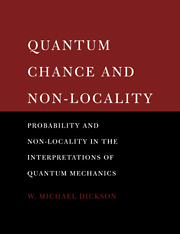 Quantum Chance and Non-locality
Quantum Chance and Non-locality Book contents
- Frontmatter
- Contents
- Preface
- Acknowledgement
- Part one Quantum chance
- Part two Quantum non-locality
- 6 Non-locality I: Non-dynamical models of the EPR–Bohm experiment
- 7 Non-locality II: Dynamical models of the EPR–Bohm experiment
- 8 Non-locality and special relativity
- 9 Probability and non-locality
- Notes
- References
- Index
8 - Non-locality and special relativity
Published online by Cambridge University Press: 11 September 2009
- Frontmatter
- Contents
- Preface
- Acknowledgement
- Part one Quantum chance
- Part two Quantum non-locality
- 6 Non-locality I: Non-dynamical models of the EPR–Bohm experiment
- 7 Non-locality II: Dynamical models of the EPR–Bohm experiment
- 8 Non-locality and special relativity
- 9 Probability and non-locality
- Notes
- References
- Index
Summary
Thus far I have been primarily concerned with how an interpretation of quantum mechanics might, or might not, be local. This question is traditionally not sharply distinguished from the question of whether quantum mechanics is consistent with the theory of relativity. However, the two questions are indeed quite distinct, and should be recognized as such explicitly.
The theory of relativity
What does relativity require?
As a first approximation, we may make the distinction by noting that the requirements of the theory of relativity are themselves unclear. Minimally, relativity seems to require that there be no way to distinguish one reference frame from another – i.e., that there be no experimental procedure that can determine which of two inertial observers is ‘really’ moving, or more generally that there be no way to discover an observer's absolute velocity.
Most authors are willing to find in (special) relativity a stronger requirement: namely, Lorentz-invariance. They say that relativity requires that in fact there is no such thing as absolute velocity. This requirement goes beyond the minimum – it might be that there is an absolute rest frame (so that absolute velocities are given by motion relative to this frame) while there is no way to find it. (As I will discuss in chapter 9, exactly this situation occurs in Bohm's theory.)
- Type
- Chapter
- Information
- Quantum Chance and Non-localityProbability and Non-locality in the Interpretations of Quantum Mechanics, pp. 163 - 178Publisher: Cambridge University PressPrint publication year: 1998


